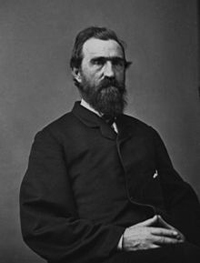Measles “attacked every part of our camp at once,” wrote John W. Tuttle, a native of Wayne County who served with the Third Kentucky Infantry during the Civil War. In 1861, while at Camp Robinson near Danville, he noted the deaths of 61 soldiers and the suffering of countless others. It “settled upon the lungs of hundreds, perhaps thousands, and more or less seriously impaired their constitutions.” The effects were so debilitating that “at times, the spasmodic coughing” of the sick, especially in the cold, rainy autumn weather, made it “almost impossible” to hear orders during drills and parades. Their commander, Colonel Thomas E. Bramlette, was so irritated by the cacophony of his non-immune troops, remembered Tuttle, that he once “severely reprimanded the men of his regiment for not having had the measles when they were children.”
In Breckinridge County toward the end of the war, Bevie Cain saw a different side effect of the illness. “We are just recovering from a long round of the measles which has been in our family for nearly three weeks!” she wrote a friend. “I have escaped thus far, though I am grieved that they have so sadly afflicted my brother, who is almost deaf.” While out hunting near a road, the boy failed to respond when some passing soldiers called out to him. “I do not know what the consequence would have been,” Bevie wrote, “if a friend of his . . . had not come to his assistance, and informed them of his misfortune.” The proud young woman, an unrepentant Confederate sympathizer, mourned her brother’s condition. “Oh! I don’t know how I could bear the thought of his remaining thus all his life.”
These accounts of the measles are part of the Manuscripts & Folklife Archives holdings of WKU’s Department of Library Special Collections. Click on the links to access finding aids. For other collections documenting Kentuckians’ battles with contagious diseases, search TopSCHOLAR and KenCat.


